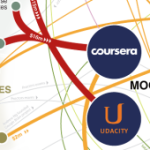Opinion: Is Online Education A Shadow Of The Real Thing?
By Paul Glader on May 27, 2014
Domestic, Education Quality, MOOCs, Opinion, Personalized Learning, Required, Universities & Colleges
By Raychel Eliopolo
One of the disadvantages of a small private liberal arts college is the lack of course options. By my senior year I had 15 credits to finish if I wanted to graduate with my class. My chances of graduating in the spring seemed bleak. Until I learned that I could take online courses at a different college while simultaneously taking a full course load at my own college.
Since my experience taking online classes relates to my timely graduation, one would think I would be in favor of an online education. For one, online, or digital, educations are highly accessible. Online courses work around your schedule. They don’t require you to even be in the same country. And in my case, online courses are a convenient option when needing or wanting to take classes that your college doesn’t provide. However, aside from these benefits, in most cases an online education is a pseudo-education not to be substituted for the real thing. By the year 2050, technology will continue to assist education rather than be the source for education.
With the rising popularity in MOOCs, Massive Open Online Courses, one would assume that the future of education is found in this online model. Prestigious institutions such as Harvard, MIT, and Stanford have made popular lecture courses available through the use of MOOCs. The astonishing rate of enrollments, including tens of thousands of participants, in online courses appear to validate the demand for accessible yet quality digital education. However an online education, even if it is fully accredited, cannot compare to a traditional classroom education.
Last May (2013) the New Yorker reported that “when MOOCs are a purely online experience, drop out rates soar to more than 90 percent.” That means that millions enrolled in these courses never end up completing the coursework. Another harsh reality reported by The Wall Street Journal adds that it is “difficult to verify that students learned anything in MOOCs.”
An online, digital education lacks the ability to exercise fundamental learning functions. This means that it hardly benefits the experiential functions of an education - the verbal, physical and social practices of learning. Online education is a very passive experience, even if there is frequent testing.
In my experience, it was far more difficult to engage with the material in my online classes than in my campus classes. I had no sense of the professor’s tone that dictates what material to focus on and what was of importance in my understanding of the material. The online forums and discussion boards were full of responses filled with platitudes from other classmates, who were just trying to fill their participation requirements. I didn’t have the physical reality of class discussion where I could engage with the material. My online classmates and even my professor held the same sentiments. My in-class education was far more edifying and educational. I couldn’t fathom taking any more classes online, let alone receiving an online education in-full.
MOOCs and online educations are beneficial means of education in some cases that exclude full-time college educations. Stanford’s president John L. Hennessy prophesies that online courses will be effective learning environments aside from the gold standard of a traditional education. He states that “while the gold standard of small in-person classes led by great instructors will remain, online courses will be shown to be an effective learning environment, especially in comparison with large lecture-style courses.” The effectiveness of an online education will suit those who have a keen will to learn in order to benefit their vocation or peak their interests. Companies such as Coursera cater to these people, who are mainly adults with bachelors degrees or working for companies that want to train and educate their employees.
An online education is a promising addition to the sphere of education in few instances. Yet, a digital education will not be able to phase out or match a traditional in-class education. If we try to replace the traditional means of learning in totality, technology may disrupt education and leave us with a pseudo-learning experience.
Eliopolo is a recent Media, Culture and the Arts graduate of The King’s College in New York City.
Related Posts
Internet highlights
- Online Casinos
- Best Non Gamstop Casinos In The UK
- Casinos Online España
- Casino En Ligne Fiable
- Non Gamstop Casino
- Online Casinos UK
- Best Online Casino Canada
- Meilleur Casino En Ligne
- Non Gamstop Casinos
- Casino En Ligne Fiable
- Non Gamstop Casino Sites UK
- Non Gamstop Casino
- Casinos Not On Gamstop
- Non Gamstop Casinos
- Best UK Casinos Not On Gamstop
- Sites Not On Gamstop
- Casinos Not On Gamstop
- Sites Not On Gamstop
- Non Gamstop Casinos
- UK Online Casinos Not On Gamstop
- Betting Sites
- Uk Horse Racing Betting
- Top UK Casino Sites
- Casino Non Aams Sicuri
- Casino Non Aams Sicuri
- Casinos Not On Gamstop
- Crypto Casino
- Meilleur Casino En Ligne
- Sites De Paris Sportifs Autorisés En Belgique
- Nhà Cái Uy Tín
- ブック メーカー 日本 おすすめ
- Nouveau Casino En Ligne 2026
- Casino En Ligne Argent Réel
- Meilleur Casino En Ligne
- Siti Non Aams Legali In Italia
- Migliori Siti Casino Non Aams
- Meilleur Casino En Ligne France 2026
- Nouveau Casino En Ligne 2026
- казино онлайн україна


Tips & Pitches
Latest WA Features
-
Online Courses Are Expanding, Along With Questions About Who Owns The Material
-
Why Size Matters: Consolidation Sweeps Across US Higher Ed
-
Trend: Corporate U Employers Offering Just In Time Education To Workers
-
Subterfuge & Skullduggery In The College Rankings Game
-
“Instreamia” Shakes Loose Moss By Launching Spanish Language Mini-MOOC
Domestic, Education Quality, For-Profit, Friend, Fraud, or Fishy, K-12, Legislation, Opinion, Personalized Learning, Regulatory, Required, Universities & Colleges - Apr 29, 2014 - 0 Comments
Michael Horn: NCAA March Madness Followed By April Blunder In Online Learning
More In For-Profit
- The Economy Is Forcing Tuition To Fall Rapidly At Private, For-Profit Colleges
- Kamenetz: Jeb Bush As Controversial Leader Of Aspen Task Force on Learning & The Internet
- Columnist Ryan Craig: The Best Of Times Could Return As For-Profit Edu Invests
- Bubble Analysis: Trace Urdan on Why This Era of Ed Investing Could Be Different
- A Blended Path? How American Honors Cuts Cost of Four Year Degree by Over a Third
Community Colleges Cost of Education Domestic For-Profit Required Student Loans Universities & Colleges
Cost of Education, Domestic, Education Quality, Friend, Fraud, or Fishy, Opinion, Personalized Learning, Required, Technology, Universities & Colleges - Jan 17, 2014 - 0 Comments
Online Education As A Postmodern Societal Response
More In Technology
- MakerBot Academy: A 3-D Printer In Every Classroom
- Michael Horn: A Look Behind The Curtain At How A MOOC Is Made
- Koller, Khan and Agarwal At The NYT’s Schools of Tomorrow Conference
- Video: New NESTA Report, Three Steps To Assess Digital Innovation in Education
- Norwegian Teens Publish Their Own Guide To Teaching and Learning In Web 2.0
Blended Learning Education Quality International K-12 Open Source Education Personalized Learning Required Technology
Domestic, Education Quality, For-Profit, Friend, Fraud, or Fishy, K-12, Legislation, Opinion, Personalized Learning, Regulatory, Required, Universities & Colleges - Apr 29, 2014 - 0 Comments
Michael Horn: NCAA March Madness Followed By April Blunder In Online Learning
More In Friend, Fraud, or Fishy
- Online Education As A Postmodern Societal Response
- Apple Tightens Its 94% Choke-hold On The Education Tablet Market
- Michael Horn: Why Obama’s Proposals Won’t Entirely Revolutionize HigherEd
- Columnist Ryan Craig: The Curious Case Of HigherEd Accreditation
- McGraw-Hill Executive Speaking About Big Data: “Don’t look at us, look at Joe Camel”
Domestic Ebooks Education Quality Ereaders Ethics Friend, Fraud, or Fishy K-12 Publishers & Curriculum Required Textbooks


![[ another head hangs lowly ] [ another head hangs lowly ]](../../../2012/2182881468_736c387be6.jpg)








Reply